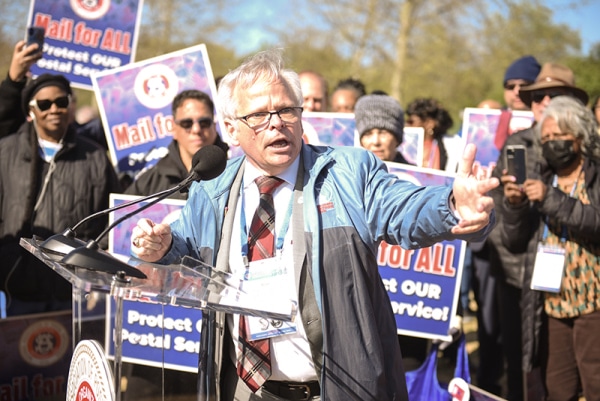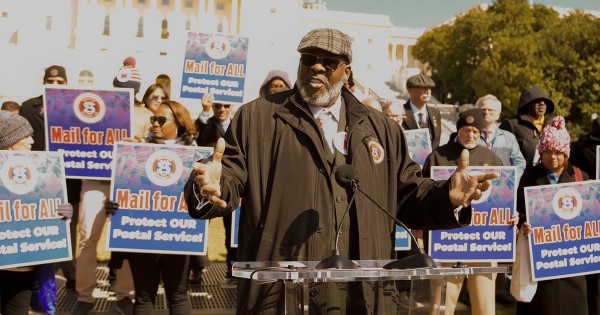Mail for All: The Threat of Privatization
Mail for All: The Threat of Privatization
By Jordanna Garland
Photos by Panoramic Visions Photography
Braving the brisk wind on April 8, a gathering of about 300 NAPS members, joined by representatives from several postal unions, stood united on the West Front Lawn of the U.S. Capitol, chanting the powerful refrain, “The mail is not for sale! The mail is not for sale! The mail is not for sale!”

The rally broadcast the clear message that the U.S. Postal Service should remain an independent agency of the federal government, as established by law in 1971. With “Postal Proud” pins over their hearts and “Mail For All” signs clutched in their hands, NAPS members were a force to be reckoned with, rallying to protect the Postal Service from recent threats of privatization and the specter of the agency being swallowed by the Department of Commerce.

“I think anytime people talk about privatizing the post office, they have no clue what the Postal Service does. The USPS delivers mail down in the Grand Canyon by horseback and, in Alaska, via helicopter,” Ken Bunch, NAPS Detroit Branch 23, said. “Private delivery services don’t want all that. They just want the easy stuff in the cities.”
The USPS delivers and serves everyone in the United States. NAPS cautioned a privatized USPS would only serve special interests and ignore postal-reliant communities. The services the agency provides likely would cease for a large portion of the country.

Prices would rise at the expense of less service. Private corporations would decide who and how many people they want to hire, eliminating fair hiring practices for disabled veterans and others. Overall, the effects of privatization would impact communities all across the country—postal workers, small businesses and the American people.
The rally, which started at 3:30 p.m. and continued until 4:30 p.m., was planned just two weeks ahead of NAPS’ Legislative Training Seminar (LTS). Speakers at the rally included NAPS President Ivan D. Butts, Executive Vice President Chuck Mulidore, Secretary/Treasurer Jimmy Warden, Past President Brian J. Wagner, Sen. Chris Van Hollen (D-MD), Rep. Kweisi Mfume (D-MD), Rep. Nikki Budzinski (D-IL), National Association of Letter Carriers National President Brian L. Renfroe, National Rural Letter Carriers’ Association President Donald L. Maston and American Federation of Government Employees National President Everett Kelley.

Butts referenced the COVID-19 pandemic in a call-and-response with rally participants. “Americans know, when they needed their medicine, who was there?” The Postal Service! “When they needed a simple service, who was there?” The Postal Service! “We’ve always been there, we always will be there because we will not give up this fight.”
In NAPS Director of Legislative & Political Affairs Bob Levi’s January column in The Postal Supervisor, he wrote about President Trump discussing his desire to privatize the Postal Service with nominated Commerce Secretary Howard Lutnick. At a news conference, Trump stated privatizing the USPS is “not the worst idea I’ve heard” and went on to say his team was “looking at it.”

This past March, Postmaster General Louis DeJoy agreed to work with Elon Musk’s Department of Government Efficiency (DOGE) in an effort to reduce costs. Although the PMG had announced his plans to step down, he abruptly resigned March 24, leaving the future of the USPS in a state of uncertainty and many frustrated.
Mfume told rally participants, “We are here for a special reason, with the Capitol behind us, to talk about why it’s so important to fight back and resist the foolishness of Donald Trump and Elon Musk. They get upset when you get together like this and make a statement. Why? Because they want everybody to not resist, to go away, to let this just fade off into memory. It’s not happening!”

Many in attendance noted that privatization would affect rural areas and smaller offices the hardest as they are the most vulnerable dealing with understaffing and low profits. According to the USPS Office of Inspector General, as of 2022, despite 16% of America’s population living in rural areas, 88% of those the USPS serves are rural communities, with 57% of post offices being located in rural America.
“It’s going to hurt rural people everywhere,” AFGE President Kelley, who hails from Alabama, said. “It’s going to hurt the small offices, the customers. It’s going to hurt everybody.”
When asked about what actions postal employees can take to help fight the threat, Wagner shared a very crucial message. “The Postal Service is not funded by taxpayer dollars. Those who want to save taxpayer dollars by privatizing the Postal Service are misguided.
“There are no taxpayer dollars to save because we don’t receive them. We are delivering their medicines, their bills, their holiday cards. Whether you are a supervisor, manager, postmaster or clerk, contact your congressional leaders to let them know how critical the Postal Service is.”
NAPS members did not just rally at the Capitol on April 8. They had the opportunity to meet with their U.S. representatives and senators to discuss safeguarding the Postal Service and other NAPS legislative priorities. During the April 6-9 LTS in Arlington, VA, discussion touched on the harm of postal privatization and why the Postal Service is such a vital asset to the American people, as well as protecting NAPS members’ benefits.

“I’m here at the Capitol today to support NAPS and the entire Postal Service and to let the president and Congress know the Postal Service is here to stay,” declared NAPS Cotton Belt Area Vice President Shri Green. “We are viable and integral to every community in this country. We deliver mail to everybody and we want to continue doing so.”
Jordanna Garland graduated last year from the University Delawarewith a BA in English. She works as a freelance writer as she continues to establish her journalism career.
